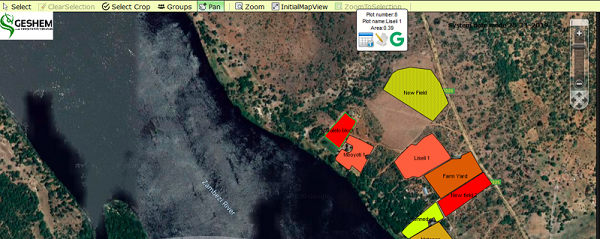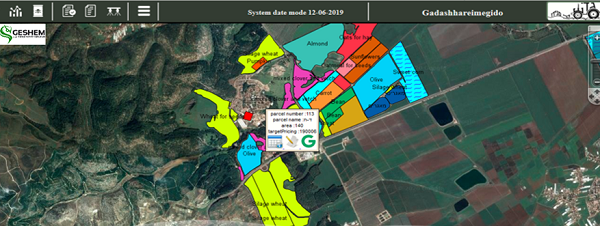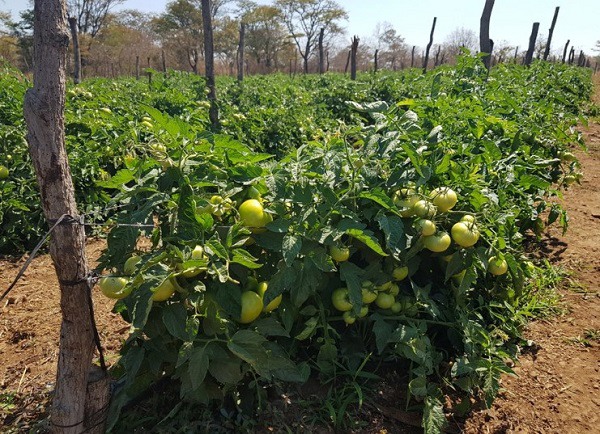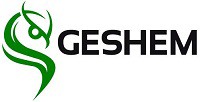“Every commercial farm has five to six different software packages, on different platforms, using different databases. With the huge leaps in agricultural technology of the past fifty years, farmers are getting enslaved in technology,” says Sagi Pinkas, CEO and founder of GESHEM.
He believes location-driven data from earth observation satellites is the key to precision agriculture.

Farmers are expending a lot of energy on sourcing their data, he says, but they are getting little from it. “Farmers are also constantly requesting assistance with optimising data entry so we have developed automated data entry capabilities for all respective crop disciplines and activities including irrigation, fertilization, crops spraying as well as detailed sub entries such as laboratory results and mechanized traceability, which drastically reduces data entry and zoom in on the essence of crop performance and costing” he says.
Another difficult issue for farmers, he points out, is herbicide residue. “The farmer splits and unites plots and in order not to make mistakes, many times a farmer is forced to manage the land less efficiently. At GESHEM, we solve this problem automatically with our unique GIS capabilities which help to avoid herbicide-crop conflicts, thereby allowing more effective use of land which save costs. The uniqueness here is that an automated alert function is not only activated and applied to the main fields but also to sub sections and plots.”
“We connect the farmer to the field by installing sensors on the tractors and sprayers and this way we enable visibility to what is actually happening in the field. Keeping track of errors like incorrect plot selection, wrong speed, skipping of spraying lanes, any of these wrong actions which can immediately be detected which saves the farmer a lot of money.”

He explains that Dr Offer Rozenstein from the Volcani Center has been developing a cloud-based service to provide growers with irrigation recommendations based on earth observation data, with no sensors at all in the ground. It can support irrigation decisions at a fine spatial resolution of 10 m that captures field variability.
High accuracy irrigation recommendations taking account of field heterogeneity
One of the goals is to remove the need for ground moisture sensors. “The advantages are very clear because field sensors suffer from two very big disadvantages: the first is that they need maintenance and the larger the farm, the more tedious the process becomes. The second disadvantage is that ground sensors may give the highest accuracy, but only in a radius of 2m2 which is very problematic because a field can be huge and not always homogeneous. Irrigation recommendation via satellite is very close to sensor accuracy with the main advantage of looking at 100% of the field and by doing so, maintaining a uniform irrigation regime, preventing disease and ultimately saving a lot of money.”
This proprietary method was developed at the Volcani Institute to estimate crop water-use, tested and validated on cotton and processing tomatoes with great success. GESHEM brings this technology to South Africa, a market chosen for the professionalism of its farmers.
 Tomato crop at Liseli Farms where a pilot programme was launched on the bank of the Zambesi Rver, Zambia
Tomato crop at Liseli Farms where a pilot programme was launched on the bank of the Zambesi Rver, Zambia
“At GESHEM, 25-30% of our income is invested in research and by working with us, you’re investing in yourself, enabling you to work with cutting edge technology instead of chasing it,” he says.
“I can say that we collaborate closely with the Volcani Institute which is, in our opinion, a leading agricultural research institute in Israel. Its researchers are very professional and very cooperative, which exactly corresponds with our worldview.”
For more information: Sagi Pinkas
Sagi Pinkas
GESHEM
Tel: + 972-507924324
Email: sagipinkas@geshem-ag.com
https://www.geshem-ag.com/
Kobus Hurter
AgricultSURE
Tel:+27 658 2978
Email: kobus@agricultSURE.co.za
